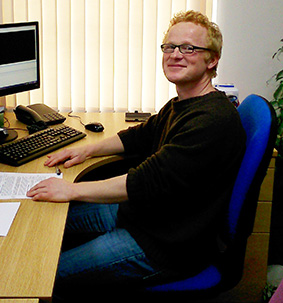Simon Collin had been a research associate for ten years when he decided he wanted to apply for an NIHR Postdoctoral Fellowship. Applying for such prestigious funding takes time, something Dr Collin did not have because the funding for his research associate post was coming to an end and he had to look for another job. But then he found out about funding that was available through the University of Bristol's Elizabeth Blackwell Institute for Health Research (EBI). The EBI's Postdoctoral Award is aimed at supporting talented and motivated researchers who wish to further their career by applying for independent, externally-funded fellowships to be held in Bristol.
“It was life-saver,” said Dr Collin. “I was effectively being made redundant and, in order to make a living, I would have had to find a job outside of the field in which I had been working for many years. But the EBI grant bought me time; time that I used to apply for an NIHR fellowship.”
Dr Collin is now funded by an NIHR Postdoctoral Fellowship to investigate diagnosis, treatment, and patient-reported outcomes for adults with chronic fatigue syndrome/myalgic encephalomyelitis (CFS/ME). He is also involved with research into chronic disabling fatigue during adolescence using data from the Avon Longitudinal Study of Parents & Children (ALPSAC/Children of the 90s).
The funding from the EBI enabled Dr Collin to spend five months applying for the fellowship and planning his research. It also enabled him to continue maintaining the CFS/ME National Outcomes Database which holds data about patients treated by NHS specialist CFS/ME services. This database is an important tool in investigating the long-term effectiveness of treatments.
“How CFS/ME is diagnosed in primary care has not been looked at in detail since 2001,” said Dr Collin. “A lot has changed since then. There has been a growing public and clinical recognition of CFS/ME and my research will look at how this has affected diagnosis rates. We also need to know how effective current treatments are for patients who are referred to NHS specialist CFS/ME services.”
Dr Collin hopes that his research will provide ideas about how to make treatments more effective in the long term.
“The EBI funding gave me the breathing space I needed in order to apply successfully for the fellowship,” said Dr Collin. “I now have a clear career path and hope my research will make a real difference to improving the care of patients with CFS/ME.”
